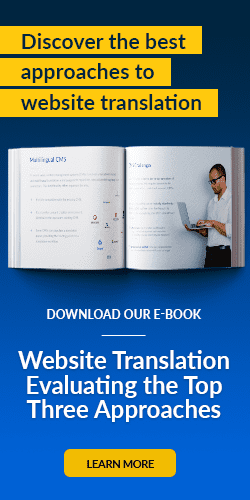As companies expand their cross-border service to online customers, they usually turn to their longtime translation partners to localize their websites.
But traditional translation agencies struggle with the technical and operational aspects of website localization. This generates more effort, cost and risk for their customers.
Legacy Approaches in a Digital World
Legacy agencies are not fluent in the unique technologies that power and manage online experiences. These gaps in knowledge and expertise can negatively impact your chances for in-market success.
Is your traditional translation vendor providing the best possible work for your website? Consider the following questions.
Legacy agencies’ website translation approaches often create more effort, cost and risk for their customers.
How Much Effort Are You Spending On the Project?
If your agency requires you to take on time-consuming processes to help it do its job, it is creating extra effort for your team. This becomes costly over time.
Does your agency ask you to:
- Identify, compile and send content for translation (including text, images, PDFs and more)?
- Oversee the receipt of this translated content?
- Integrate the translated content into the proper international instance of your CMS?
- Conduct QA to ensure the content properly fits within established page templates, and doesn’t “break” page designs due to word growth?
- Repeat this entire process on an ongoing basis as your website is updated with new or revised content?
If so, your agency isn't equipped to efficiently or cost-effectively handle your website translation project. You're spending more time, effort and resources managing this process than you should.
Examine the tasks your agency asks you complete so it can do its job. It might be generating unexpected costs in the process.
Do They Have the Proper Technologies?
Website translation projects certainly require linguistic fluency-but technical fluency is far more important. Your agency should use technologies and workflows that are optimized for online translation. Ask your agency if it offers:
- Turn-key operation that eliminates all effort for you—not just at the localized website’s launch, but during day-to-day operation
- Change-detection technology that instantly queues new and updated content for translation, and requires no effort from your team to manage
- Platform-agnostic technology that works with all CMSs, third-party platforms (such as e-commerce modules) and programming languages
If it doesn’t, you can expect to experience unforeseen effort, costs and delays on a continual basis.
Your agency should use technologies optimized for online translation that minimize, or eliminate, effort on your end.
Do They Deliver Relevant Translations for Online Users?
Traditional agencies excel at providing linguistically-accurate translations. But they regularly fall short of delivering content that matches the expectations of online users. This means your localized website may feature proper grammar and word choice, but it isn't actually relevant to what customers are looking for.
People use the Internet, and conduct online searches, on their terms, not yours. They regularly use slang, or phrases that defy conventional word choice. Legacy agencies cannot adapt to the rapidly-changing vocabulary of web and mobile users.
Linguistically-perfect translations are great, but may fall short in website translation projects. Relevant keywords are important.
It's uncommon for legacy agencies to conduct thorough keyword research, or other digital-first best practices to improve user experiences and international SEO. This linguistic disconnect leads to discoverability issues via organic search, and subpar customer experiences.
Conclusion
When it comes to website localization, your current agency may not be the best choice. You can certainly keep your agency for document translations, but other website translation solutions exist that leverage smart technologies, and don't waste your time or resources to achieve results.
In fact, some solutions require no daily involvement from you, enabling your team to focus on more important tasks.
These approaches deliver translations that are more consistent and relevant to your customers—and do it more reliably, quickly, affordably … and effortlessly … than traditional agencies.
Last updated on October 13, 2017
